Reducing inequalities in water supply, sanitation, and hygiene in the Era of the Sustainable Development Goals - Synthesis Report of the WASH Poverty Diagnostic Initiative
The World Bank (2017)

Published in: 2017
Pages: 115
Publisher:
International Bank for Reconstruction and Development / The World Bank, Washington, USA
Author:
The World Bank
Uploaded by:
Lara Nassar
834 Views
15 Downloads
The Sustainable Development Goals (SDGs) and the World Bank’s corporate goals of ending extreme poverty and boosting shared prosperity call for specific attention to the poor and vulnerable. The overarching objective of the SDGs is to end poverty in all its forms, but their key difference from the earlier Millennium Development Goals (MDGs) is the integration of social, economic, and environmental goals (UN 2015). This has significant implications for reforms aimed at improving service delivery. With this understanding as its guiding compass, the Water Supply, Sanitation, and Hygiene (WASH) Poverty Diagnostic Initiative focuses on what it would take to reduce existing inequalities in WASH services worldwide.
This report, a synthesis of that global initiative, offers new insights on how data can be used to inform allocation decisions to reduce inequalities and prioritize investment in WASH to boost human capital. It also offers a fresh perspective on service delivery that considers how institutional arrangements1 affect the incentives of a range of actors. When it comes to improving services, politics matters as much today as it did in the London of the mid-19th century.
Importantly, as will be discussed below, the report does not offer prescriptive global solutions for service delivery challenges. Instead, it seeks to encourage a dialogue on ways to think and work differently, using a problem-driven approach and engaging with the constraints imposed by the broader governance environment
Bibliographic information
The World Bank (2017). Reducing inequalities in water supply, sanitation, and hygiene in the Era of the Sustainable Development Goals - Synthesis Report of the WASH Poverty Diagnostic Initiative. International Bank for Reconstruction and Development / The World Bank, Washington, USA
Filter tags
Case studies in other formats Educators English Practitioners














